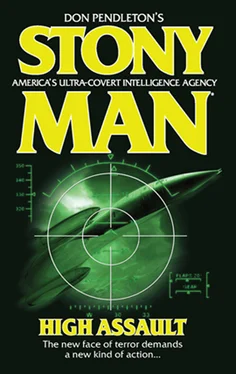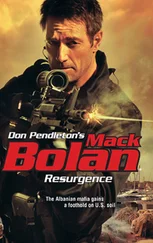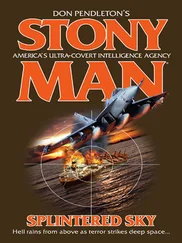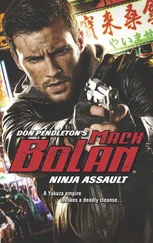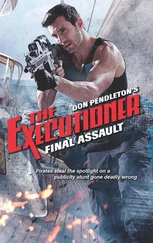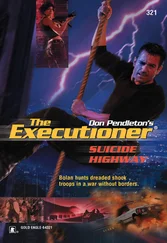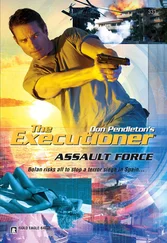Anjali had seen enough special operations soldiers in his life to recognize the type. The elite always had more in common with each other than even with others of their own country or military. Anjali was a wise enough and realistic enough man to know he himself did not belong among their ranks. It was no matter of ego for him; his interests lay in other directions.
At the moment he remained focused on gaining these mysterious commandos’ trust, leading them into hostile terrain beyond the reach of help and then betraying them—making himself a little wealthier in the process.
The first man to reach Anjali was tall and broad with fox-faced features and brown eyes and hair. Having spent the past five years operating alongside British forces in Basra, the Shiite police officer recognized an Englishman even before he spoke and revealed his accent.
“You Anjali?” David McCarter asked.
Anjali nodded, noting the man did not identify either himself or his unit. Behind the Briton his team paused: a tall black man with cold eyes, a stocky Hispanic with a fireplug build and scarred forearms standing next to a truly massive individual with shoulders like barn doors and an M-60E cut-down machine gun. Behind the tight little group another individual, as tall and muscular as the rest, turned and surveyed the windows and rooftops of the buildings overlooking the secured helipad. There was a sniper-scoped Mk 11 with a paratrooper skeletal folding stock in his hands, the eyepieces on the telescopic sight popped up to reveal an oval peep sight glowing a dim green.
“We were briefed on the flight in,” McCarter continued. “You get us past the Iraqi security checkpoints and militia crossings until we’re within striking distance, then fall back with the reserve force should we need backup.”
“Just so.” Anjali nodded. “I’m surprised you agreed to having only Iraqi forces as overwatch. Did you work with us in Basra before?” The question was casually voiced, but still constituted a breach of etiquette in such situations.
“Has there been a change in the situation since our initial briefing?” the black man asked, cutting in.
Anjali turned to face Calvin James, noting the H&K MP-7 submachine gun dangling from a sling off his shoulders down the front of his black fatigue shirt. In his big, scarred hands the man casually cradled a SPAS-15 dual mode combat shotgun, its stock folded down so that he held it by the pistol grip and forestock just beyond the detachable drum-style magazine.
Just as with the rest of them Anjali saw the man’s black fatigues bore no unit insignia, name tag or rank designation. His voice was flatly American, however, the accent bearing just a trace of the Midwest, but the major couldn’t be sure.
The Iraqi pretended not to notice the pointed disregarding of his own indelicate question. Behind the team the Black Hawk’s engines suddenly changed pitch and began to whine as the helicopter lifted off.
Anjali shook his head to indicate no to the black man’s questions, then waved his hand toward the armored personnel carrier parked on the edge of the helipad’s concrete apron. The Dzik-3 was a multipurpose armored car made by Poland and used by Iraqi army and police units throughout the country.
The 4.5-ton wheeled vehicle boasted bulletproof windows, body armor able to withstand 7.62 mm rounds, puncture-proof tires and smoke launchers. T. J. Hawkins, covering the unit’s six o’clock as they made for the APC, thought it looked like a dun-colored Brink’s truck and doubted it could withstand the new Iranian special penetration charges being used in current roadside IEDs—Improvised Explosive Devices. He would have felt a lot safer in an American Stryker or the Cougar armored fighting vehicle.
He was used to stark pragmatism, however, and made no comment as he scrambled inside the vehicle, carefully protecting his sniper scope.
It had been easier to coordinate a blacked-out operation through local Iraqi forces than to bring British authorities operating in the Basra theater in on the loop because the deployment had been so frenzied. Hawkins accepted the situation without complaint.
Inside the armored vehicle the team sat crammed together, muzzles up toward the ceiling. Rafael Encizo sat behind the driver’s seat holding a Hawk MM-1 multiround 40 mm grenade launcher. As Anjali settled in the front passenger seat beside his driver he looked back at the heavily armed crew with a frown.
“I am in charge of my vehicle during transport and thus am commanding officer for this phase of the operation,” he said, voice grave. “I’m afraid I’m going to have to insist that you put your weapon safeties on.”
McCarter leaned forward, shifting his M-4/M-203 combo to one side as he did, the barrel passing inches from Anjali’s face. He held up his trigger finger in front of the Iraqi major’s face and smiled coldly.
“Sorry, mate,” he said. “I know you’ve heard this before but—” he wiggled his trigger finger back in forth in front of Anjali’s eyes “—this is my safety.” He settled back into his seat. “End of story.”
Anjali turned around, face red with fury. He slapped the dash of the vehicle and curtly ordered his driver to pull away from the tarmac of the helipad. As the vehicle rolled out into traffic, he forced himself to calm. It was as the old Arabic proverb, claimed by the English as their own, said: who laughs last laughs best, and Major Anjali planned to be laughing very hard indeed at the end of the next few hours.
PHOENIX FORCE REMAINED alert as the Dzik-3 left the main traffic thoroughfares surrounding the airport and pushed deeper into the city. They rolled through Iraqi national army and police checkpoints without a problem, but as the buildings grew more congested and rundown, and the signs of the recent civil conflicts became more prolific—in the form of bullet-riddled walls, the charred hulks of burned-out vehicles, gaping window frames and missing doors—so did flags and graffiti proclaiming Shia slogans and allegiance.
Now the checkpoints were manned by local force police officers who all wore subtle indicators of tribal allegiance in addition to their official uniforms. Portraits of the firebrand Shiite cleric Muqtada al-Sadr became prominent. They were entering a section of the city where centralized authority had lost its influence and clan leaders and imams were the de facto power structures.
The checkpoint stops became longer and the night grew deeper. In the backseat Gary Manning used the GPS program on his PDA to plot their course as they moved through the city. After a moment he froze the screen and leaned forward to tap McCarter on the shoulder. “We’re here,” he said.
McCarter nodded and looked out a side window. They had entered an area of urban blight forming a squalid industrial bridge between two more heavily populated sections of the city. The dull brown waters of the Shatt al-Arab, the waterway formed by the confluence of the Tigris and Euphrates rivers, cut through concrete banks lined with empty and burned-out factories, manufacturing plants and abandoned electrical substations. A rusting crane sat in a weed-choked parking lot like a forgotten Jurassic beast of steel and iron.
“Pull over,” McCarter told Anjali.
The major looked back in confusion. “What? We still have two more checkpoints to go before the rendezvous point,” he protested.
“Pull over. We have our own ops plan,” McCarter stated. “When we give the signal, you and the chase vehicle can meet us at the RP. We’ll insert on foot from here.”
“This isn’t what I was told—” Anjali sputtered.
“Pull over.”
Anjali scowled. Then he barked an order to his driver, who immediately guided the big vehicle over to the side of the road. They rolled to a stop and Phoenix Force wasted little time scurrying out of the vehicle, weapons up.
Читать дальше
